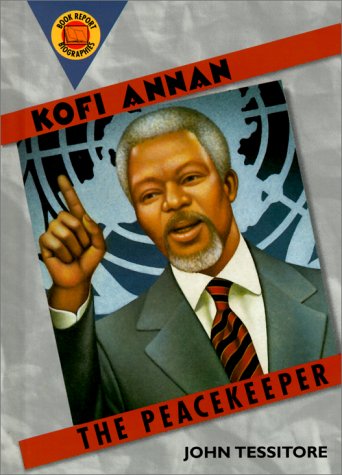
|
Author: John Tessitore Price: $ 15.59 (new) $ 0.54 (used) Medium: Library Binding (96 pages) Publisher: Franklin Watts 2000-09 |
As a biography, Tessitore's account left me dissatisfied, since it gave me little detail about the life of Kofi Annan. It would be a perfect option for someone seeking only a very broad understanding of Mr. Annan's background. Considering he had access to scarce information himself, I guess Tessitore did a good job. But this begs the question: Why write a biography on a man you know very little about? OK book about a very bad man.
OK book about a very bad man.
Kofi Annan is a sick man and a dangerous one at that. Kofi Annan: The Peacekeeper is ironic in that Annan has been indirectly and directly responsible for the deaths of many people due his being asleep at the wheel at the UN, support for Arafar, etc.
Jeff Jacoby recently wrote that he is basically a symptom of UN's sickness. Jacoby noted that just last week, Annan woke up to a Wall Street Journal column by Glenn Harlan Reynolds, publisher of the influential InstaPundit website, urging that he be replaced by Vaclav Havel, the much-admired former president of the Czech Republic.
In The New York Times, op-ed eminence William Safire reviewed the revelations that link the massive oil-for-food scandal to Annan's own family: Until this year, his son Kojo was getting monthly payments from a firm that had a major oil-for-food contract with the UN -- even though he'd left the company in 1998. The corruption enveloping the UN will not begin to dissipate, Safire wrote, until Annan resigns, "having, through initial ineptitude and final obstructionism, brought dishonor on the Secretariat of the United Nations."
Meanwhile, the latest National Review was out, with its cover photo of Annan and the headline, in large red letters: "You're Fired!" An editorial inside insisted that "Annan should either resign, if he is honorable, or be removed, if he is not," while an essay by Nile Gardiner, a former aide to British Prime Minister Margaret Thatcher, explained why "Kofi's hour is up." With his record, Gardiner observed, "if Annan were the CEO of a Fortune 500 company . . . he would have been forced to resign months ago."
On Wednesday came another call for Annan's ouster, this one from the chairman of the Senate's Permanent Subcommittee on Investigations, which has amassed evidence that Saddam Hussein used stolen oil-for-food dollars to underwrite terrorism and suborn at least one senior UN official. It is "abundantly clear" that Kofi Annan should resign, Senator Norm Coleman said. "As long as Mr. Annan remains in charge, the world will never be able to learn the full extent of the bribes, kickbacks, and under-the-table payments that took place under the UN's collective nose."
But odds are the world won't much care about getting to the bottom of the latest UN scandal. UN scandals rarely provoke lasting outrage. There was no global uproar when the brutal regime in Libya was chosen to chair the UN's Human Rights Commission. Nothing happened to the UN after its troops allowed Serbs to slaughter 8,000 Muslim men and boys in the "safe haven" of Srebrenica. Sex scandals seem to erupt wherever the UN goes -- the latest involves charges of rape, child abuse, and prostitution by UN personnel in the Congo -- but they never cause heads to roll in Turtle Bay. Annan himself became secretary general despite his failure, when he headed the UN's peacekeeping operations, to pay attention to warnings of genocide in Rwanda.
Why should anything be different this time? Oil-for-food may be the greatest international rip-off of modern times, it may have strengthened one of the world's bloodiest dictators, but if history is any guide, the scandal headlines will fade from view long before the secretary general does. By week's end, in fact, dozens of governments, including all the permanent members of the Security Council save the United States, had publicly rallied to Annan's support. Scandal or no scandal, he will almost certainly serve out the remaining two years of his term.
Which is just as well. Annan is merely a symptom of the UN's sickness, not the cause of it. His resignation would do nothing to reform the UN into the engine of peace and liberty its founders envisioned. Better that Annan remain in place as a symbol of UN fecklessness and failure, and a spur to those who can envision something better.
The UN is a corrupt institution, one that long ago squandered whatever moral legitimacy it had. The UN's founding documents venerate justice and human rights, but for the past 40 years, the organization has been dominated by a bloc of states -- essentially the Afro-Asian Third World -- most of whose governments routinely pervert justice and violate human rights.
Inside the United Nations, there is no difference between a dictatorship or a democracy: Each gets exactly one vote in the General Assembly. The reason the UN indulges vicious regimes like those in North Korea, Syria, and Cuba is that they are members in good standing, and most other governments lack the courage to cross them. The UN cannot be fixed unless that changes -- and that isn't going to change.
Kofi is a bad man.